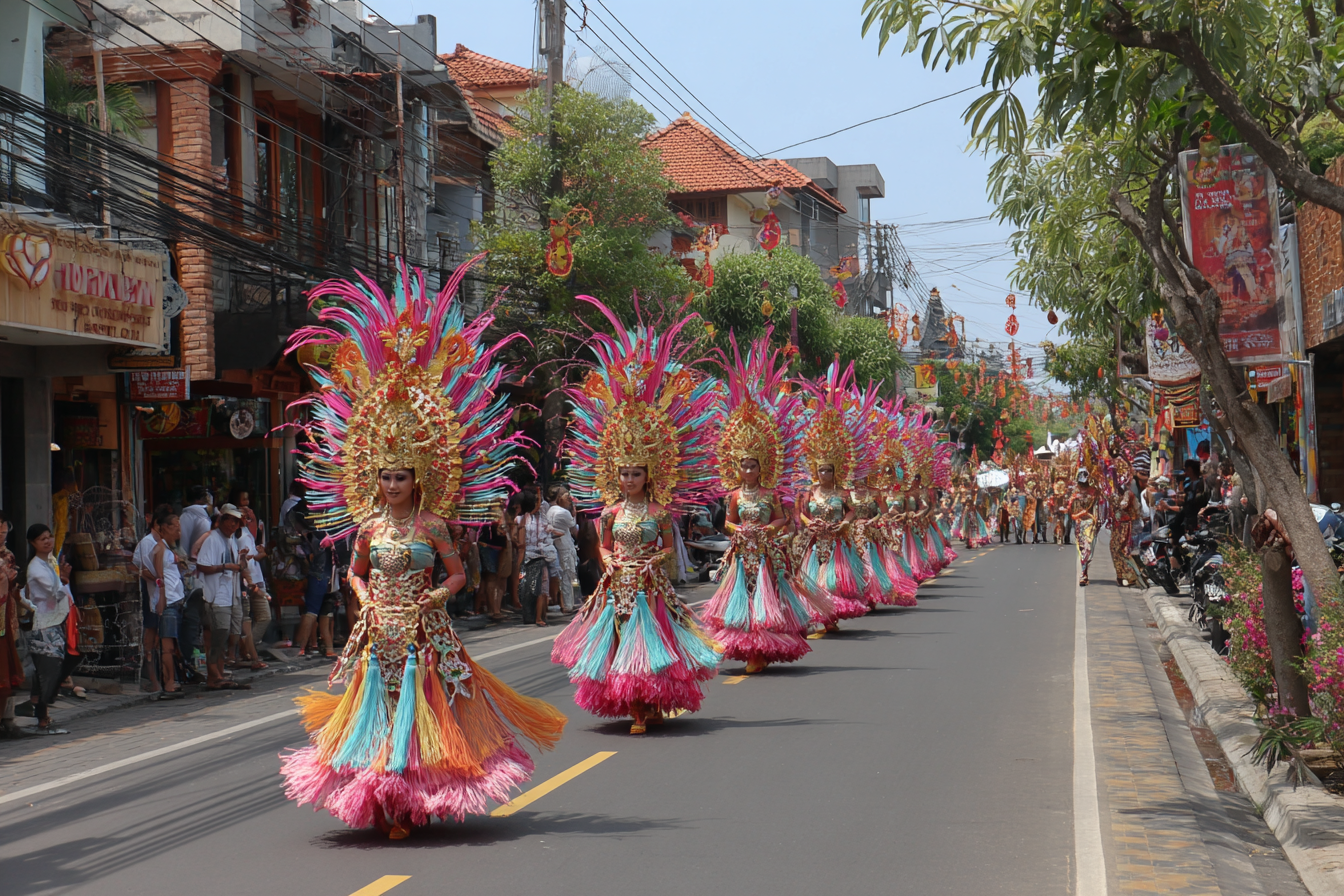Ubud, the cultural heart of Bali, is much more than a picturesque town surrounded by lush rice terraces and intricate art workshops. It’s a vibrant hub where traditional Balinese culture pulses through every street, temple, and home—especially during local festivals. These celebrations offer visitors an unparalleled chance to witness Bali’s spirituality and artistic expressions up close, allowing you to experience the island’s rich heritage in living form. Throughout the year, Ubud’s local festivals bring the community together in colorful displays of devotion, music, dance, and culinary delights, each rooted deeply in Hindu traditions and Balinese customs.
Exploring Ubud’s Major Local Festivals
Ubud’s festival calendar is packed with significant Balinese celebrations that mark the cycles of life, spirituality, and nature. Among the most prominent are Galungan, Kuningan, and Nyepi, but there are many others worth noting for a comprehensive cultural experience.
- Galungan: A festival signifying the victory of dharma (good) over adharma (evil). It occurs every 210 days according to the Balinese pawukon calendar and lasts for 10 days. During Galungan, the entire town is decorated with colorful bamboo poles called penjor, elaborately crafted offerings, and traditional dances that honor ancestral spirits and gods.
- Kuningan: Celebrated 10 days after Galungan, Kuningan marks the end of the festival cycle. It involves ceremonies to send ancestral spirits back to the spiritual realm, with complex offerings made from golden-colored ingredients symbolizing prosperity and blessings.
- Nyepi: Known as the “Day of Silence,” Nyepi is a unique Balinese Hindu New Year celebration that involves a full day of fasting, meditation, and strict silence. The day before Nyepi features lively parades of ogoh-ogoh (demon effigies), designed to chase away evil spirits. On Nyepi itself, everything in Ubud comes to a standstill, offering visitors a rare moment of tranquility.
Other noteworthy festivals include the Omed-omedan (the Kissing Ritual) and the Bali Spirit Festival, both showcasing unique blends of traditional and contemporary culture. These festivals vary by village and temple within Ubud, providing rich diversity in the celebrations.
Typical Festival Activities and Ceremonies
Local festivals in Ubud are a fascinating mix of community rituals, artistic performances, and spiritual observances. Visitors can witness:
- Temple Ceremonies: These include offerings, prayers, and purification rites led by Balinese priests, typically held at temples or family compounds.
- Traditional Dance Performances: Authentic Balinese dances like the Barong and Legong depict mythological stories and are performed in open-air stages or temple courtyards.
- Market Festivities and Food Stalls: Festivals often feature vendors selling local delicacies, handmade crafts, and festival-specific treats.
- Community Activities: Games, competitions, and rituals such as processions where locals dress in intricate customary attire.
These activities offer an immersive experience into Balinese life, blending spirituality with artistic expression and communal joy.
How Tourists Can Respectfully Participate or Observe
Experiencing Ubud’s festivals can be deeply rewarding, but it’s crucial for visitors to approach these sacred events with respect and sensitivity. Here are some tips for participating or observing without disrupting local customs:
- Dress Modestly: Wear clothing that covers shoulders and knees, especially when entering temples or sacred areas—sarongs and sashes are often provided at some temples.
- Ask Permission Before Taking Photos: Always seek consent before photographing people, ceremonies, or sacred artifacts. Some rituals may be closed to outsiders.
- Observe Silence and Reverence: Avoid loud talking or disruptive behavior, especially during prayers and solemn rituals.
- Follow the Lead of Locals: Watch how locals participate and follow their example respectfully.
- Do Not Touch Offerings or Sacred Objects: These have deep spiritual significance and should be treated with utmost respect.
Festival Schedules and Planning Your Trip
Because many Balinese festivals follow the pawukon calendar, which is different from the Gregorian calendar, dates shift annually. Here’s how to plan your trip around key festivals in Ubud:
- Research Accurate Dates: Check updated festival dates from reliable Balinese cultural websites, travel forums, or local tour guides.
- Book Accommodation Early: Festivals attract many visitors and locals alike, so accommodations can fill up quickly.
- Plan for Transportation: Traffic and crowding may increase during major festivals; consider walking or using bicycles for easier access.
- Consider Guided Cultural Tours: These offer expert insights into the significance of the ceremonies and ensure a respectful viewing experience.
Being informed in advance helps you enjoy the festival fully while avoiding last-minute hassles.
Impact of Festivals on Local Life and Tourism
Local festivals are more than celebrations; they are the lifeblood of Ubud’s cultural identity. For residents, these events strengthen community bonds, preserve traditions, and allow the passing down of cultural knowledge to younger generations. Economically, festivals bring a boost through tourism, supporting artisans, performers, and small businesses.
However, there is a delicate balance between showcasing culture and protecting it from over-commercialization. Responsible tourism encourages appreciation without exploitation by adhering to ethical tourism practices and engaging with local guides and businesses.
Photography and Videography Tips
Capturing the magical moments of Ubud’s festivals requires respect and preparation. Here’s how to get the best shots without offending local custom:
- Use a Zoom Lens: Allows you to photograph from a respectful distance without intruding.
- Be Mindful of Lighting: Festivals often take place in dim temple settings or at night; consider using a camera with good low-light capabilities.
- Ask for Permission: Especially when photographing people or sacred rituals.
- Avoid Flash Photography: It can be disruptive or disrespectful during ceremonies.
- Stay Observant: Certain moments may be too sacred or private for recording, so always follow cues from locals and guides.
Etiquette and Cultural Sensitivity Advice
To fully honor the spirit of Ubud’s festivals, visitors should be mindful of the following cultural etiquettes:
- Respect Religious Practices: Participate only as invited or observe quietly.
- Use Both Hands When Giving or Receiving Offerings: It shows respect and gratitude in Balinese culture.
- Remove Your Hat and Sunglasses During Ceremonies: To show reverence and avoid appearing distracted or disrespectful.
- Do Not Point Your Feet Toward People or Altars: Feet are considered the lowest and dirtiest part of the body in Balinese culture.
- Confirm Festival Rules with Your Host or Guide: Customs may vary between villages and temples.
By honoring these norms, you contribute to preserving the sanctity of festive celebrations and foster mutual respect.
Connecting with Ubud’s Living Traditions
Experiencing Ubud’s local festivals is an extraordinary way to engage with Bali’s timeless traditions. These vibrant celebrations are not just spectacular events but gateways to understanding the island’s deep connection to spirituality, community, and nature. Whether you’re watching a mesmerizing dance, admiring intricate offerings, or witnessing a profound day of silence, you become part of a living cultural tapestry that continues to thrive. Approach these festivals with an open heart, a respectful attitude, and a curious spirit, and you’ll carry home memories that transcend the typical travel experience, enriching your journey in meaningful ways.







